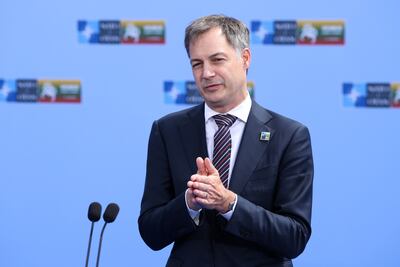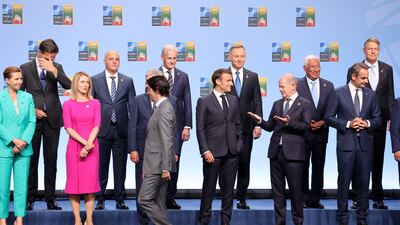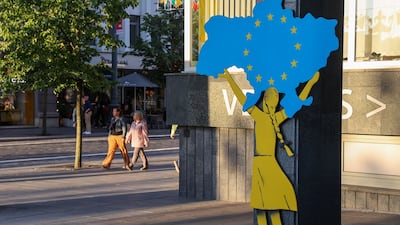Nato leaders told The National on Tuesday that they had reached a broad general consensus to continue increasing their defence spending and boost the readiness of their military in case of a Russian attack.
But analysts say it remains to be seen if they will succeed in delivering on these promises with more troops on the ground.
“The security situation has significantly changed, so that helps with the sense of urgency,” Norwegian Defence Minister Bjorn Arild Gram told The National on the sidelines of the Nato summit in Vilnius.
Russia's war in Ukraine has pushed Nato to draw up new defence plans, detailing how to respond to an attack from Moscow – a first since the Cold War.
At a summit in Spain last year, Nato decided to put 100,000 forces at a 10-day readiness to deploy, and a further 200,000 to 30 days.
These plans are to be reviewed at the two-day summit in Lithuania. They represent a “shift in mindset”, a Nato official told journalists during a brief.
“Thirty days of readiness – that more or less means that soldiers are sitting on their packs, ready to go somewhere,” the official told The National.
Mr Gram acknowledged that there were “difficult priorities domestically” that may get in the way of increased defence spending.
“But I think there’s broad political consensus among countries that the insurance price is now rising, and we have to do more to secure our country,” said Mr Gram.
Norway announced in May that it planned to reach the Nato defence spending target of two per cent of its gross domestic product by 2026. It now stands at 1.67 per cent.
Oil-rich Norway is one of Nato’s wealthiest members. Like many other European countries, it is also battling high inflation, which reached a new record of 7 per cent in June. Norway replaced Russia as Europe’s top gas supplier since the invasion of Ukraine.
"Concrete plans"
Leaders gathered in Vilnius pointed at military efforts made by their countries in the past year as proof of their commitment to increase defence spending and support Ukraine.
The Norwegian army has sent 200 soldiers to Lithuania. Overall, allies have sent battle groups to primarily fortify regions bordering Russia, including in Lithuania, Estonia and Romania.
“We now have concrete plans when it comes to command structure, to regional plans and to force structures,” Mr Gram said. “Now we can go forward and implement this.”
The details of such plans remain confidential for security reasons.
Belgium’s Prime Minister Alexander De Croo said that allies had “great appreciation” for the work done by Nato’s Supreme Allied Commander Europe, Gen Christopher Cavoli.
The plans were “made under huge pressure, and now, they are being executed” Mr De Croo told The National.
“It is a big effort. It is true.
“But in combination [with] the efforts and spending that we do – together with the unity of 32 countries that believe in freedom, respect and democracy – it’s the best way of maintaining our security.”
Nato’s 31 allies are expected to welcome Sweden soon after difficult negotiations with Turkish President Recep Tayyip Erdogan that lasted more than a year.
Mr Erdogan on Monday promised to ask the Turkish Parliament to vote on Sweden's membership bid.

Belgium has troops present in Romania and later this year it will send more troops to Lithuania.
After decades of reduced spending, Nato’s new defence plans are "ambitious", said Rafael Loss, co-ordinator of pan-European data projects at the European Council on Foreign Relations think tank.
Nato members have to be ready to spend a “lot more than they have in the past,” he said.
Allies on Tuesday pledged to make the two per cent defence spending target a floor, not a ceiling, as they had previously decided in 2014.
The summit's first day was overshadowed by Ukraine’s membership bid. Despite Kyiv's pleas for a fast-track membership, Nato leaders stopped short of extending an invitation or a timetable.
They agreed to drop the requirement for Ukraine to fulfil what is called a Membership Action Plan (MAP), effectively removing a hurdle from Kyiv’s path into the alliance.
Defence expenditure will increase by 8.3 per cent in 2023 across European allies and Canada – the biggest in decades, according to Nato Secretary General Jens Stoltenberg.
Yet, only 11 allies reach or exceed the two per cent spending target, Nato's latest annual report on defence expenditure shows.
They are: Poland, the US, Greece, Estonia, Lithuania, Finland, Romania, Hungary, Latvia, the UK and Slovakia.
New pledges have to be reflected in concrete increases in national defence budgets, Mr Loss said.
“We’ll have to watch what political agreements governments can create in their domestic political context for public support for these measures.”























